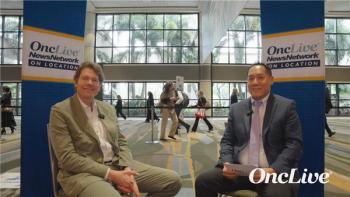
Robert Emmons, MD, FACP, Joshua Brody, MD, and Javier Pinilla, MD, PhD, sit down with Chandler Park, MD, FACP, to discuss the latest abstracts in chronic lymphocytic leukemia and lymphoma presented during the 2025 ASH Annual Meeting & Exposition.

Your AI-Trained Oncology Knowledge Connection!


Robert Emmons, MD, FACP, Joshua Brody, MD, and Javier Pinilla, MD, PhD, sit down with Chandler Park, MD, FACP, to discuss the latest abstracts in chronic lymphocytic leukemia and lymphoma presented during the 2025 ASH Annual Meeting & Exposition.

AZD0120 CAR T therapy shows rapid, deep responses and manageable safety in R/R myeloma, with ultra-fast manufacturing and strong early durability.

In case you missed any, read a recap of every episode of OncLive On Air that aired in November 2025.

Here is your cheat sheet to all therapeutic options that were cleared by the FDA in November 2025 spanning tumor types.

Dr Richter discusses the rationale for targeting FcRH5 in myeloma and the evaluation of cevostamab-based combination strategies in this disease.

Joshua Richter, MD, discusses the exploration of CELMoDs in the treatment of patients with multiple myeloma.

Surbhi Sidana, MD, and Joshua Richter, MD, discuss the FDA approval of BVd for relapsed/refractory myeloma after at least 2 prior lines of therapy.

Joshua Richter, MD, discusses the use of next-generation CELMoDs to boost T-cell responses with bispecific antibodies or CAR T-cell therapy in myeloma.

A mogamulizumab-based combination led to complete remission in a patient with CAR-positive T-cell lymphoma with CCR4 overexpression.

Experts preview abstracts being presented at IMS, highlighting the role of MRD, bispecific antibodies, and other strategies to refine myeloma management.

Sundar Jagannath, MBBS, explores how minimal residual disease could redefine what it means to achieve a "cure" in multiple myeloma.

The top 5 OncLive videos of the week cover insights in lung cancer, myelofibrosis, and mantle cell lymphoma.

Here is your guide to all therapeutic options that were approved by the FDA in July 2025 spanning tumor types.

Joshua Richter, MD, outlines how trispecific antibodies and novel CAR T-cell therapies are shaping the 2025 myeloma landscape and improving patient access.

John Sfakianos, MD, shared findings from an analysis of mitomycin intravesical solution from the phase 3 ENVISION trial in recurrent NMIBC.

John O. Mascarenhas, MD, discussed findings from the IMproveMF trial investigating imetelstat plus ruxolitinib in patients with higher-risk myelofibrosis.

Dr Galsky discusses the FDA approval of neoadjuvant durvalumab plus chemotherapy followed by adjuvant durvalumab monotherapy for MIBC.

Matthew Galsky, MD, discusses the significance of the FDA approval of neoadjuvant durvalumab plus chemotherapy followed by adjuvant durvalumab in MIBC.

The top 5 OncLive videos of the week cover insights in multiple myeloma, AL amyloidosis, myelofibrosis, breast cancer, and sarcoma.

Joshua Richter, MD, discusses the identification of early abnormalities that may indicate that a patient has multiple myeloma.

A clinical trial steering committee from the Mount Sinai Health System helped integrate therapeutic clinical trials into the SOC for patients with cancer.

Here is your snapshot for all therapeutic options that were approved by the FDA in March 2025 spanning tumor types.

During Multiple Myeloma Awareness Month, Joshua Richter, MD, highlights advances in T-cell–redirecting therapies in the space.

During Multiple Myeloma Awareness Month, Joshua Richter, MD, highlights symptom recognition and precursor conditions for the malignancy.

Eczema-linked protein helps cancer survive, suggesting potential for skin drug-based treatment.

Research from the Icahn School of Medicine at Mount Sinai provides new insights into acute myeloid leukemia (AML) and its resistance to a common treatment.

Nina Bhardwaj, MD, PhD, of Mount Sinai has been elected to the National Academy of Medicine for her pioneering work in cancer immunotherapy.

Genetic markers for venetoclax could help personalize treatment and improve outcomes

With a focus on closing gaps in cancer care for underserved populations, Joseph A. Sparano, MD, FACP, always strives to put patients first—a quality that has become a hallmark of his research and career in oncology.

Lunresertib plus camonsertib demonstrated efficacy and safety in heavily pretreated endometrial cancer and platinum-resistant ovarian cancer.